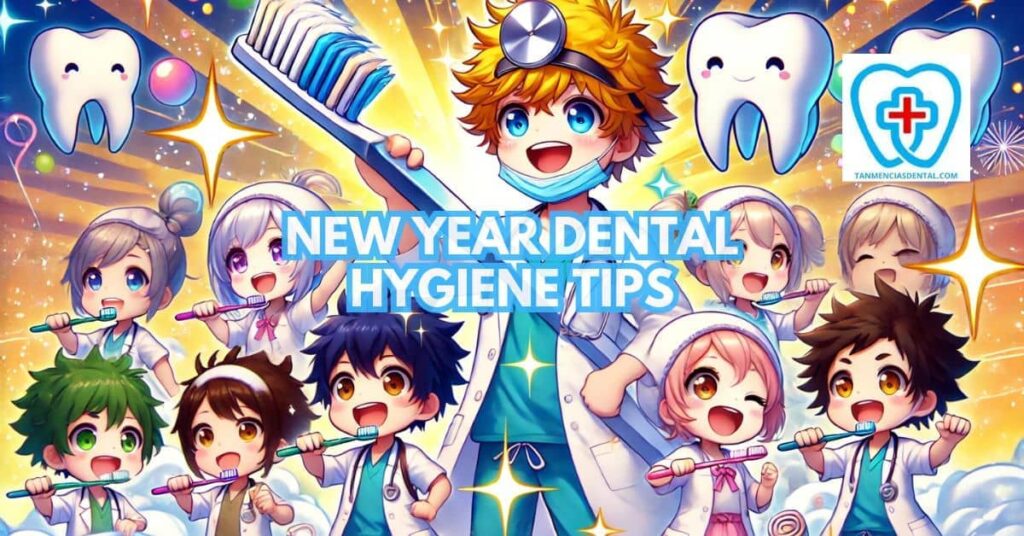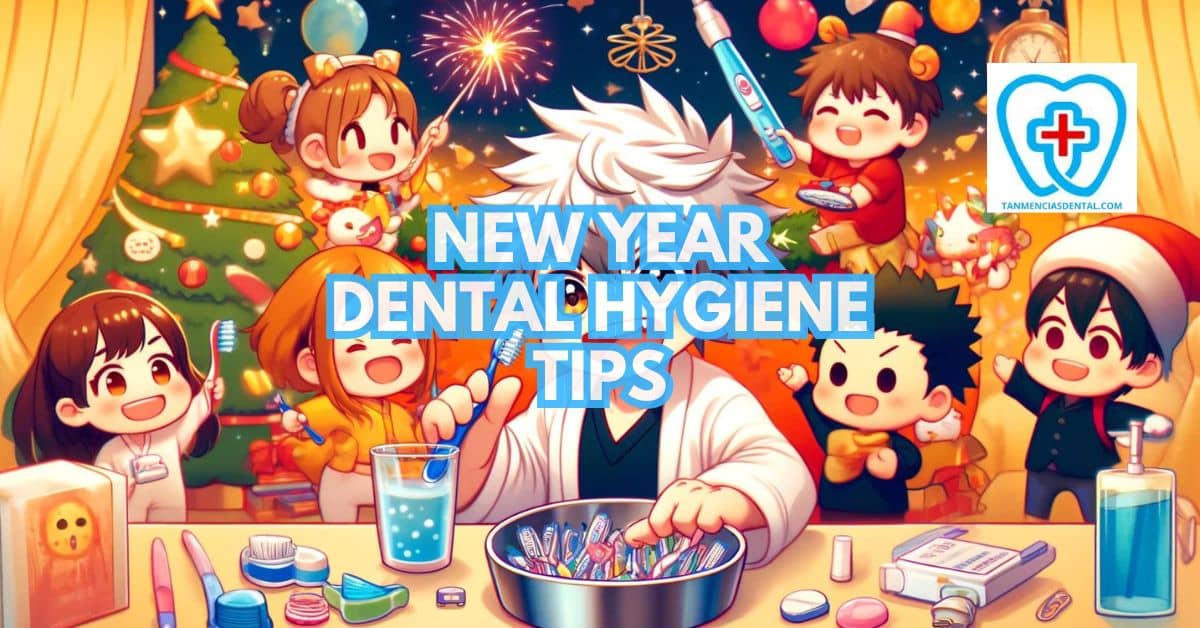The New Year offers a perfect opportunity to adopt better habits, especially for your dental hygiene.
Following new year dental hygiene tips can help you achieve a healthier and brighter smile.
Taking care of your teeth not only improves their appearance but also prevents problems like cavities and gum disease.
Simple changes in your daily routine, such as brushing and flossing correctly, can make a big difference in your oral health.
Commit to these tips this year and enjoy stronger teeth and greater confidence in your smile.
1. Choose the Right Toothbrush: A Foundation for Oral Hygiene
Choose the right toothbrush to build a strong foundation for good oral hygiene practices.
A toothbrush with soft bristles is recommended because it will clean your teeth effectively without causing damage to your gums or enamel.
The size of the brush head matters too; it should be small enough to reach all areas of your mouth, including the back teeth.
For a more thorough cleaning, you might want to consider an electric toothbrush, as it can help remove more dental plaque.
It’s also essential to replace your toothbrush regularly since bristles wear down over time and become less effective.
Using fluoride toothpaste along with your toothbrush can help prevent tooth decay and strengthen your enamel.
Maintaining a toothbrush in good condition, along with proper brushing techniques, will ensure you continue practicing excellent oral hygiene.
🦷 Protect Your Smile: How to Prevent Chipped Teeth and Tartar Buildup
2. Master the Art of Brushing Your Teeth
Effective brushing requires more than just a quick scrub.
Aim to brush your teeth for at least two minutes, twice daily, covering all surfaces of each tooth.
Employ a gentle, circular motion rather than aggressive back-and-forth strokes to avoid damaging your gums.
Pay special attention to hard-to-reach areas and the back teeth, which are often neglected.
Incorporating this thorough technique into your routine ensures the removal of plaque and prevents the buildup of tartar.
🦷 Kickstart Your Oral Health: Top New Year’s Dental Resolutions
3. The Importance of Toothpaste in Your Dental Routine
Using toothpaste is a fundamental step in every dental care routine and crucial for achieving a healthy smile.
It works effectively to remove food remnants and plaque, a harmful layer on your teeth that leads to decay if not addressed.
The inclusion of fluoride in toothpaste is a key feature, as it repairs and fortifies tooth enamel, thus acting as a barrier against the development of cavities.
When choosing toothpaste, it’s important to consider your specific dental requirements—be it sensitivity reduction, teeth whitening, or enamel protection—to ensure that your oral care routine is tailored to your needs.
For children, a pea-sized amount of toothpaste is recommended to minimize the risk of ingestion, which underscores the importance of supervision during brushing.
Brushing at least twice a day with the correct toothpaste not only enhances the cleanliness of your teeth but is also essential for overall health.
Therefore, selecting the right toothpaste is more than just a detail; it’s a significant contributor to maintaining your oral health and ensuring the longevity of your healthy smile.
🦷 Braces Off! What to Expect When Your Braces Are Removed (And Does It Hurt?)
4. Don’t Neglect Your Gums: Tips for Gum Health
Gum health is just as important as the health of your teeth.
Flossing daily is crucial for removing plaque and food particles that a toothbrush can’t reach, especially under the gum line.
If your gums bleed during flossing, it may indicate early stages of gum disease, which should not be ignored.
Massaging your gums gently with your toothbrush or using a water flosser can also promote circulation and gum health.
Regular checkups allow your dentist to monitor your gum condition and address any issues before they become serious.
🦷 Electric Toothbrushes: Do They Really Whiten Your Teeth? What You Need to Know

5. Rinse Away Bacteria with Mouthwash
Incorporating mouthwash into your daily routine can provide an additional layer of protection for your teeth and gums.
Mouthwash can reach places that brushing and flossing may miss, helping to eliminate the bacteria that cause plaque and bad breath.
Choose a therapeutic mouthwash containing fluoride or antimicrobial agents for the best results against tooth decay and gum disease.
It’s not just about killing bacteria; some mouthwashes help to strengthen enamel and refresh your breath.
However, mouthwash should complement, not replace, brushing and flossing for optimal oral health.
🦷 Brushing with Braces: How Often Should You Clean Your Teeth?
6. Managing Stress for Better Oral Health
Stress can cause people to grind their teeth, which may wear down enamel and lead to tooth damage.
It can also weaken the gums, making them more susceptible to gum disease and infections.
Finding ways to reduce stress, such as exercising, meditation, or talking to a friend, can help protect your smile.
Taking breaks and ensuring you get enough sleep are simple methods to lower stress levels.
By managing stress, you not only feel better but also keep your teeth and gums healthier.
🦷 The High Cost of Braces: Uncovering the Hidden Expenses of Orthodontics
7. Overcome Dental Anxiety: A Step Towards Better Oral Health
Dental anxiety is a common barrier that prevents many from seeking necessary care.
Open communication with your dentist about your fears can lead to adjustments in treatment methods to ensure your comfort.
Sedation dentistry, including nitrous oxide or oral sedation, can be a game-changer for those with severe anxiety, making dental visits much more manageable.
Modern dental practices often include comforting amenities like music or virtual reality glasses to help distract and relax patients.
Overcoming dental anxiety not only improves your oral health but can also lead to more positive associations with dental care, making future visits less daunting.
🦷 Toothache and Pregnancy: How to Manage the Pain Without Stress
8. Schedule Regular Dental Checkups: Prevention is Key
Taking good care of your teeth is essential for both your oral and overall health, and regular dental checkups play a crucial role in this process.
By scheduling visits to your dentist every six months, you allow for the early detection of potential problems, such as decay or gum disease, before they escalate into more severe conditions.
These appointments are not only for problem-solving but also include professional cleanings to remove tartar buildup—a task that regular home brushing and flossing can’t accomplish on their own.
This thorough cleaning helps keep your teeth healthy, preventing the progression of plaque to tartar, which can lead to cavities or infections.
Moreover, during these checkups, dentists perform screenings for oral cancer, which is an invaluable preventive measure that could potentially save your life.
By making these dental visits a regular part of your health care routine, you’re investing in the long-term maintenance of your oral health.
Adhering to a schedule of regular dental visits and cleanings is a key component in taking good care of your teeth, ensuring they remain healthy for years to come.
🦷 Brace Yourself: How Long Does It Take to Remove Braces and What’s the Process?
9. Embrace a Diet that Supports Dental Health
The foods you eat play a critical role in your dental health.
Diets rich in calcium, phosphorus, and vitamin D, found in dairy products, fish, and leafy greens, help strengthen teeth and bones.
Crunchy fruits and vegetables, like apples and carrots, can stimulate saliva production and naturally clean your teeth.
Avoiding sugary snacks and beverages reduces the risk of cavities and tooth decay.
By choosing nutritious foods, you are directly contributing to the strength and longevity of your teeth and gums.
🦷 Gingivitis in Kids: A Parent’s Guide to Treatment and Prevention
10. Stay Hydrated for Oral Hygiene
Water is essential for maintaining oral hygiene as it helps to wash away food particles and bacteria that can lead to cavities.
Drinking water after meals can reduce the effects of acidic and sticky foods and beverages.
Fluoridated water, where available, can add an extra layer of protection by helping to remineralize teeth.
Adequate hydration also supports saliva production, which is vital for oral health, as saliva neutralizes acids and distributes essential nutrients.
Making water your drink of choice throughout the day is a simple and effective way to support your oral health.
🦷 Choosing the Right Dentist for Implants: Key Tips You Can’t Miss
11. Quit Smoking for Your Oral Health
Smoking is one of the most significant risk factors for several oral health issues, including gum disease, tooth loss, and oral cancer.
The chemicals in tobacco smoke interfere with the function of gum tissue cells, affecting the attachment of bone and soft tissue to your teeth.
Quitting smoking can drastically improve your oral health, reducing the risk of disease and improving the healing capacity of your gum tissue.
There are many resources available to help quit smoking, including nicotine replacement therapies and support groups.
Taking the step to quit can lead to a healthier mouth and a more vibrant smile.
🦷 Tan-Mencias Dental Clinic Marikina
👨⚕️ Conclusion
As the New Year unfolds, committing to these dental hygiene tips can lead to significant improvements in your oral health.
Each small change in your daily routine can cumulate into lasting benefits for your teeth and gums.
Remember, oral health is closely linked to your overall well-being, so taking care of your mouth is an investment in your general health.
Make a strong commitment to dental hygiene this year so that your smile will be healthy and beautiful for years to come.
Embrace these habits not just as resolutions but as lifelong contributions to your health and happiness.
😁 Self-Promotion
Discover the path to a brighter smile at Tan-Mencias Dental Clinic, nestled in the heart of Parang, Marikina City!
Our friendly team is dedicated to providing you with the highest quality of dental care in a comfortable and welcoming environment.
Whether you have a question, need advice, or are ready to schedule your next appointment, we’re just a call or message away.
Reach out to us at 9171451074, write to us through our Facebook page, or use our website’s contact form for any inquiries.
Let us help you achieve the healthy, radiant smile you deserve—your journey to optimal dental health starts with Tan-Mencias Dental Clinic.

